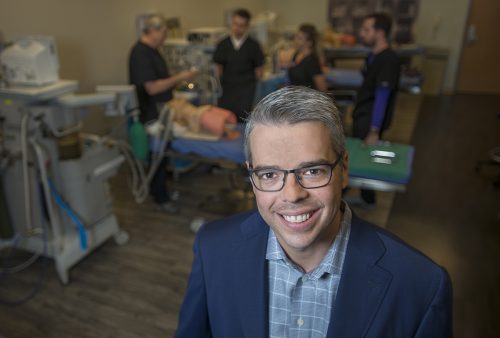Personalized Medicine is Tomorrow’s Health Care
Pharmacogenomic testing opens the possibility of a tailored mix of medicines.

Getty Images © Andrew Brookes
Personalized Medicine is Tomorrow’s Health Care
Pharmacogenomic testing opens the possibility of a tailored mix of medicines.
Each person’s body metabolizes medicines differently, depending in large part on genetic makeup. Pharmacogenomics, which focuses on the relationship between double helixes and drugs, “is basically the study of how genes predict things that are going to happen,” said nurse anesthetist J. Dru Riddle.
Genetic predictions revealed by pharmacogenomic testing are crucial in anesthesia, where responsiveness to strong soporific and analgesic medicines can alter surgical recovery time or even prevent opioid addiction.
The science explaining how drugs and genes interact is solid, said Riddle, assistant professor of professional practice in the Harris School of Nurse Anesthesia, “but there’s not a lot of uptake of that science on the clinical side of things.”

J. Dru Riddle of the Harris College of Nursing & Health Sciences measured opinions among certified registered nurse anesthetists about pharmacogenomic testing. Photo by Robert Hart
Do nurse anesthetists understand pharmacogenomics’ potential for delivering optimal doses of pre- and postsurgical drugs, tailored for an individual’s genetic signature? Since no one had done a comprehensive analysis of professional attitudes in the field, Riddle designed a survey to gauge knowledge and assumptions about pharmacogenomics.
To guide survey development, Riddle arranged interviews with nine nurse anesthetists and one anesthesiologist in North Texas. He said the respondents, on the whole, reported not using the testing. Some of the medical professionals didn’t have access to laboratories capable of analyzing personal genomes in a drug-based context. Others overestimated the cost of testing, which runs a few hundred dollars on average.
Riddle distilled their explanations for not embracing the technology into seven key themes, including ethical concerns and confusion over how to make use of the data. He then translated those themes into a 14-question survey that he distributed to 6,000 certified registered nurse anesthetists in a national database.
The survey results, published in the journal Pharmacogenomics, reiterated much of what the original respondents said: Medical professionals need additional training on how to understand pharmacogenomic test results and how to apply them in clinical practice.
“People were very interested in trying to figure out how to actually use [pharmacogenomics],” said Riddle, who also directs the Center for Translational Research at TCU.
The School of Nurse Anesthesia is applying Riddle’s research findings in its curriculum so future practitioners will have pharmacogenomic knowledge when they acquire prescriptive power. “We’re starting in the classroom now because it’s much easier to introduce it into practice than to change practice,” Riddle said. “If it’s not scary, people will get it.”
TCU’s Harris College of Nursing & Health Sciences also covers the basics of pharmacogenomics in the undergraduate nursing curriculum, said Kathy Baker, associate professor of nursing who advised Riddle on the study design.
“It’s very foundational, but at least it’s not foreign to them,” she said. “Hopefully as they enter into their focused practice areas, they’ll begin to at least pay attention to the pharmacogenomics specific to their area of practice.”
By covering the new approach to pharmacology, Harris College is helping students get an early handle on tomorrow’s health care routines, when personalized medicine will be the norm, Riddle said. “I would say certainly within the foreseeable near future, so in five to 10 years perhaps, we will see pharmacogenomic testing used almost always in every patient.”

Your comments are welcome
Comments
Related reading:
Campus News: Alma Matters, Research + Discovery
Altering Antibiotics
Student in TCU high school program works on medicines of tomorrow.
Features, Research + Discovery
The Genetics of Anthrax
Kevin Claunch ’14 postponed medical school to do research in microbiology. His work might lead to medicines able to disarm anthrax or even common staph infections.
Features, Research + Discovery
Leading a Culture Change in Health Care
Faculty at the Harris College of Nursing & Health Sciences are helping fuse research with health care practice.